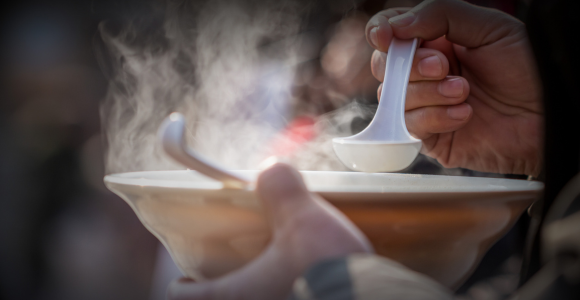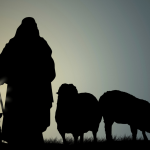
Feeding People is Holy Work
Next, Jesus feeds them. This part of our post-resurrection story is almost identical to the early story in John of the feeding of the multitude: Jesus once again breaks and blesses bread and fish. This is the earlier story:
When Jesus looked up and saw a great crowd coming toward him, he said to Philip, “Where shall we buy bread for these people to eat?” He asked this only to test him, for he already had in mind what he was going to do. Philip answered him, “It would take more than half a year’s wages to buy enough bread for each one to have a bite!” Another of his disciples, Andrew, Simon Peter’s brother, spoke up, “Here is a boy with five small barley loaves and two small fish, but how far will they go among so many?” Jesus said, “Have the people sit down.” There was plenty of grass in that place, and they sat down (about five thousand men were there). Jesus then took the loaves, gave thanks, and distributed to those who were seated as much as they wanted. He did the same with the fish. When they had all had enough to eat, he said to his disciples, “Gather the pieces that are left over. Let nothing be wasted.” So they gathered them and filled twelve baskets with the pieces of the five barley loaves left over by those who had eaten. (John 6:5-13)
Welcome Readers! Please subscribe to Social Jesus Here.
This is Part 3 of Justice Work is Holy Work
(Read this series from the beginning at Part 1 and Part 2.)
When Jesus recreates the same imagery after the resurrection, the disciples can’t help but recognize who Jesus is. It is in this moment that the story says, “None of the disciples dared ask him, ‘Who are you?’ They knew it was the Lord.”
Then, after they finished eating, we had this exchange with Peter:
. . . When they had finished eating, Jesus said to Simon Peter, “Simon son of John, do you love me more than these?”
“Yes, Lord,” he said, “you know that I love you.”
Jesus said, “Feed my lambs.”
Again, Jesus said, “Simon, son of John, do you love me?”
He answered, “Yes, Lord, you know that I love you.”
Jesus said, “Take care of my sheep.”
The third time he said to him, “Simon, son of John, do you love me?”
Peter was hurt because Jesus asked him the third time, “Do you love me?” He said, “Lord, you know all things; you know that I love you.”
Jesus said, “Feed my sheep.
Very truly I tell you, when you were younger, you dressed yourself and went where you wanted; but when you are old you will stretch out your hands, and someone else will dress you and lead you where you do not want to go.” Jesus said this to indicate the kind of death by which Peter would glorify God. Then he said to him, “Follow me!” (John 21:1-19)
So much ink has been spent on the differing Greek words used for “love” here. That’s not what I want us to focus on this week. What matters more is Jesus’ response to Peter’s declarations each time. We must be careful not to miss this gospel’s point. As Jesus has fed the disciples, so they must feed others. It’s important not to spiritualize this story but to read it as it is, materially. Jesus says, “Feed my lambs, take care of my sheep. Feed. My. Sheep.”
The needs of the people are holy. Their needs were holy for Jesus and they must be holy for Jesus followers today, too. Working for people’s material, physical, concrete daily needs (like bread and fish) is sacred, holy work. Others may call it a social gospel, but it is the same work Jesus engages in the gospel stories and the same work he calls each of his followers to engage as well.
I’m reminded of the words of Bonhoeffer in his letters from a German prison cell. It’s good place to end our contemplation this week:
“There remains an experience of incomparable value . . . to see the great events of world history from below; from the perspective of the outcast, the suspects, the maltreated, the powerless, the oppressed, the reviled — in short, from the perspective of those who suffer.” (Dietrich Bonhoeffer, Letters and Papers from Prison)
The needs of the people are holy. Feeding the people is sacred work. Justice work is holy work.
Are you receiving all of RHM’s free resources each week?
Begin each day being inspired toward love, compassion, justice and action. Free.
Sign up at HERE.















